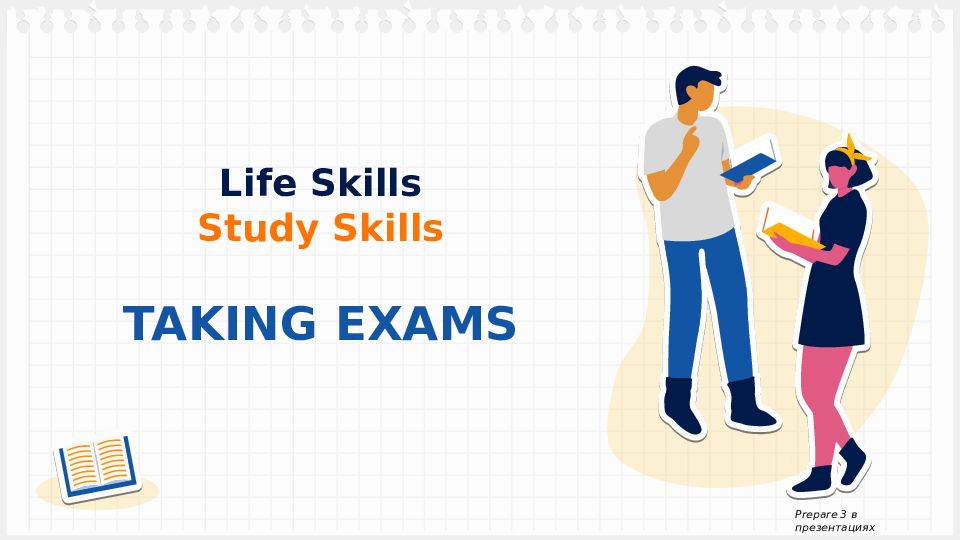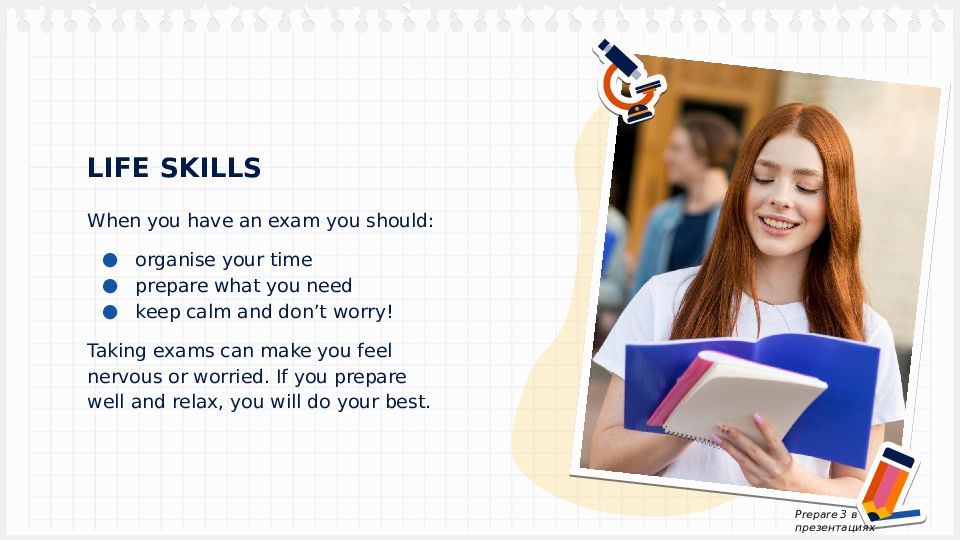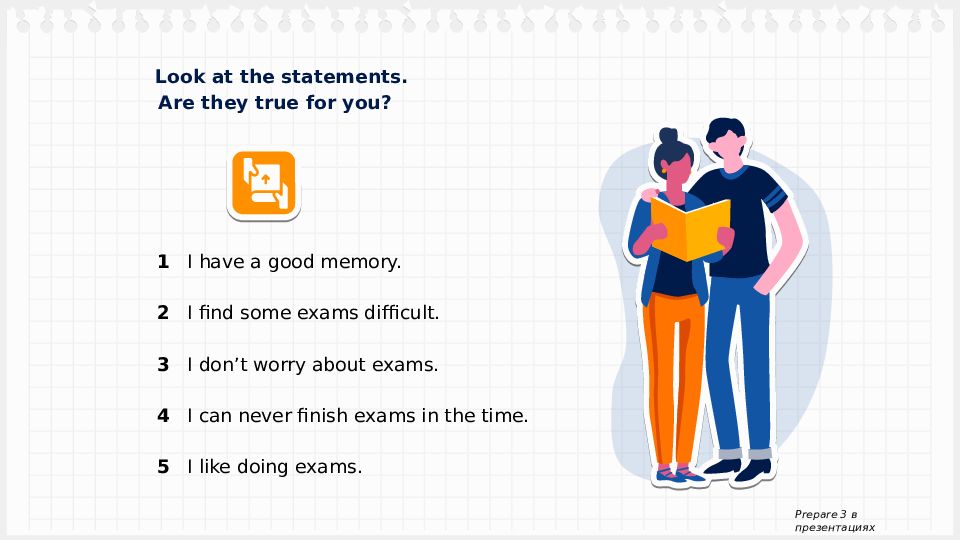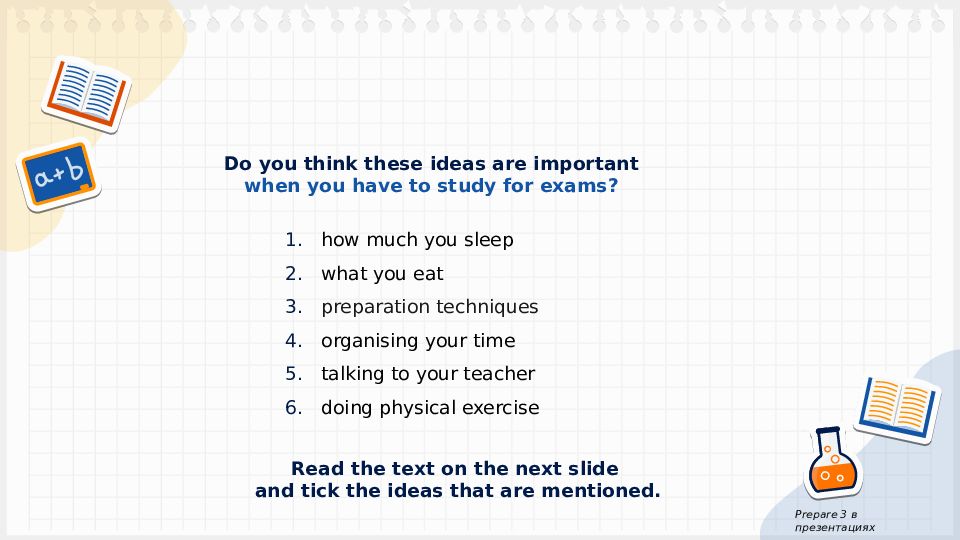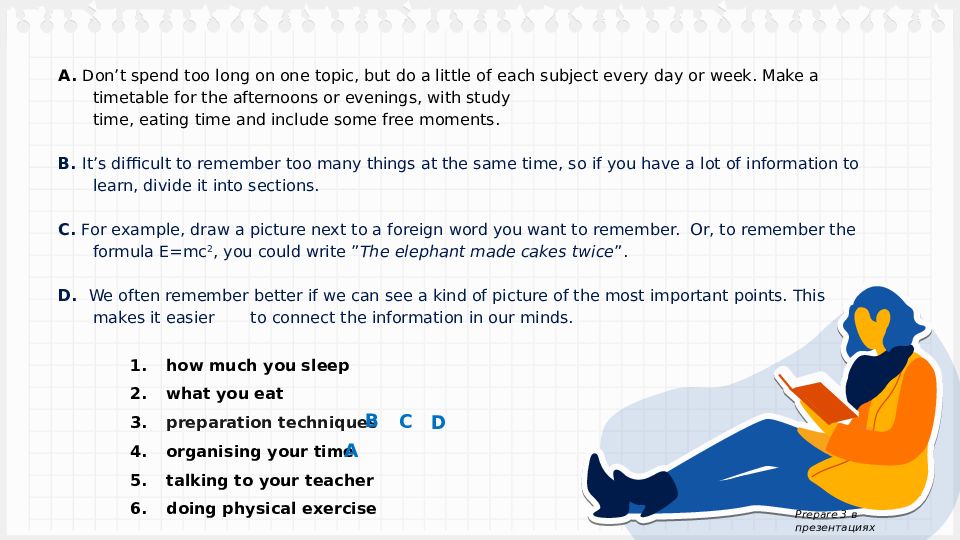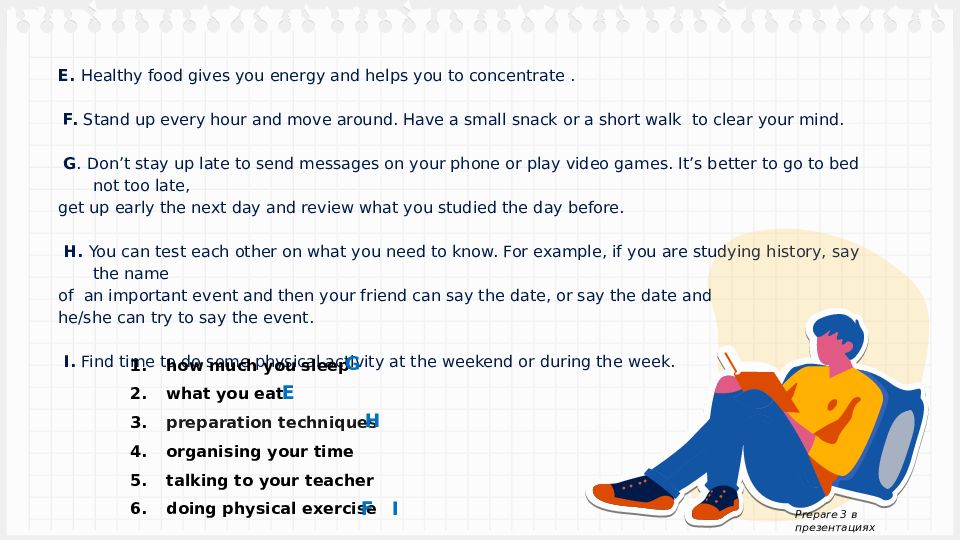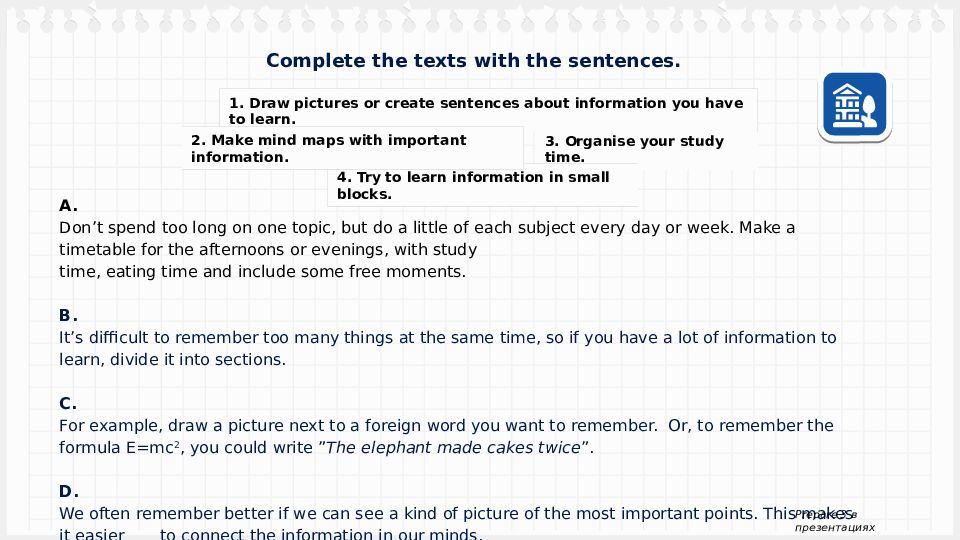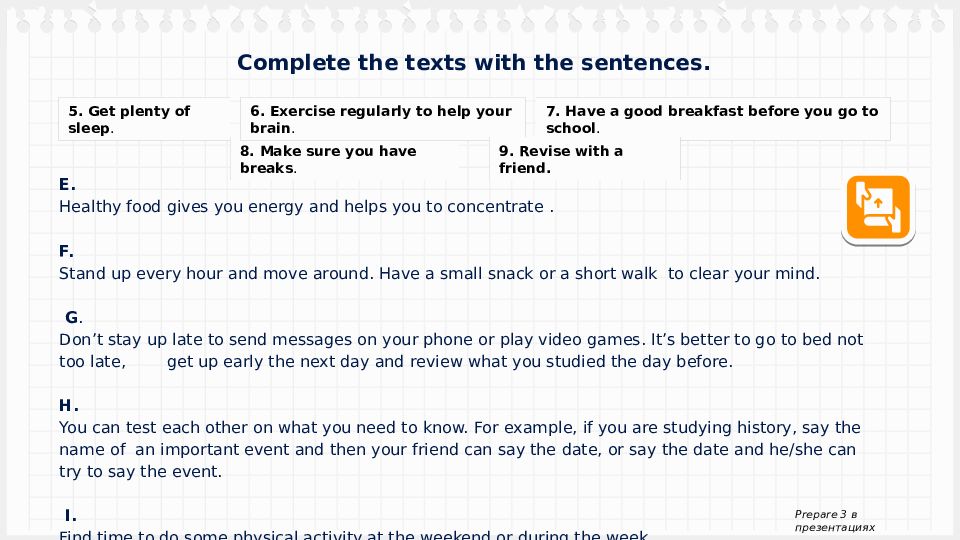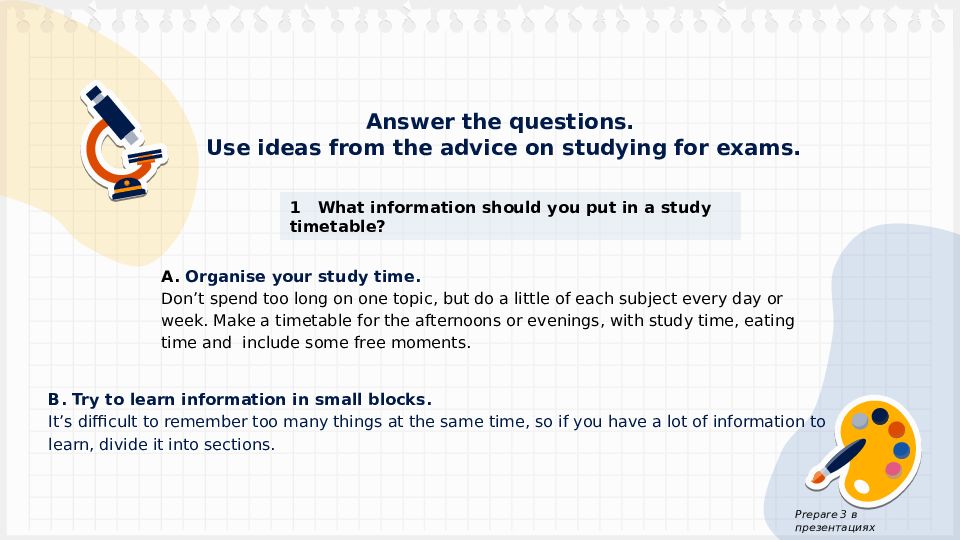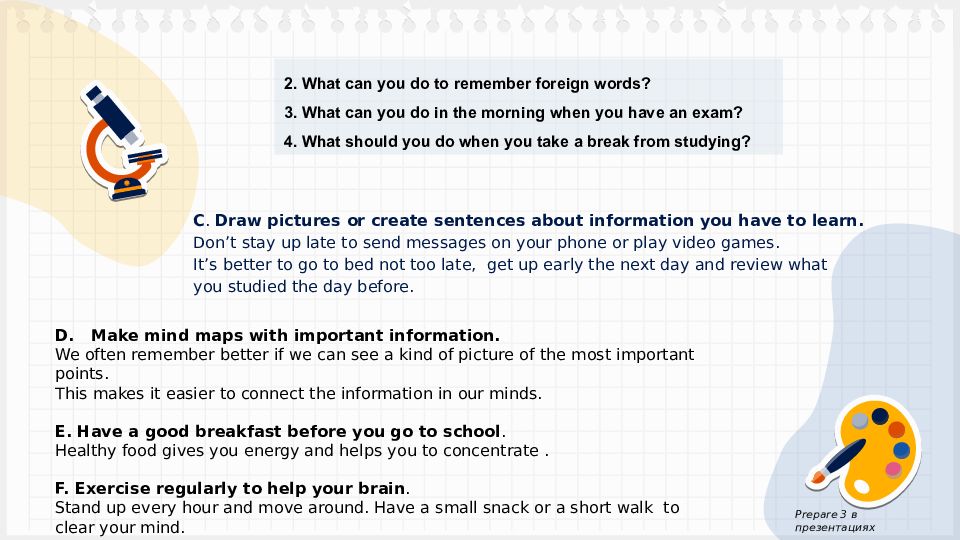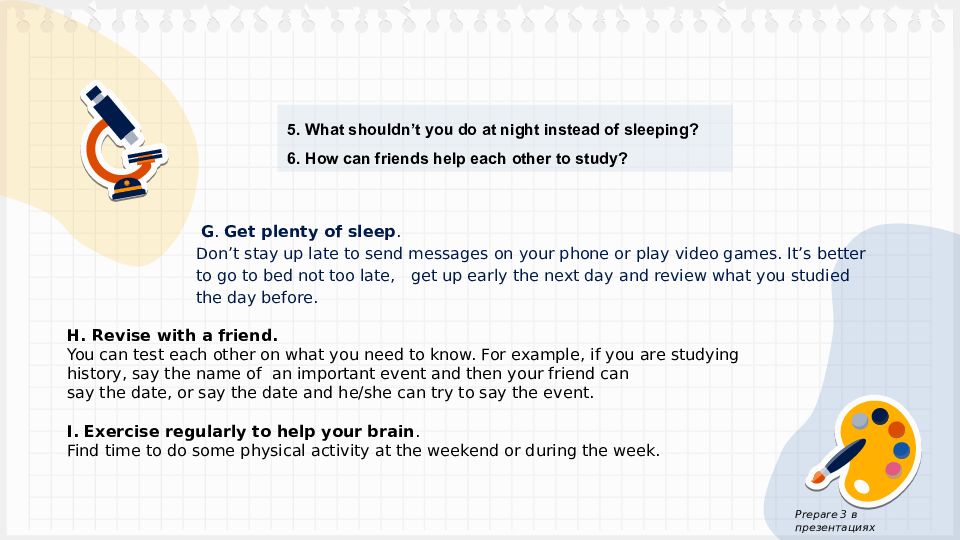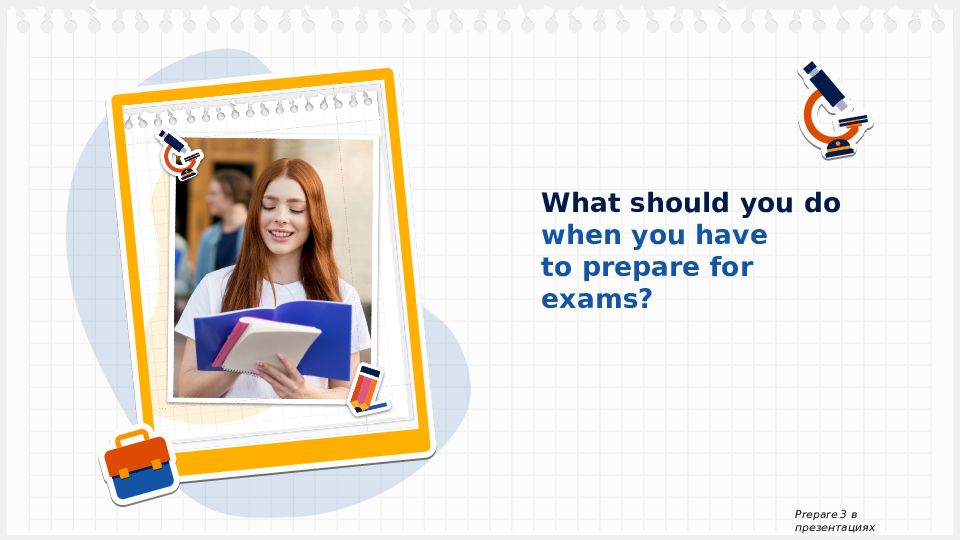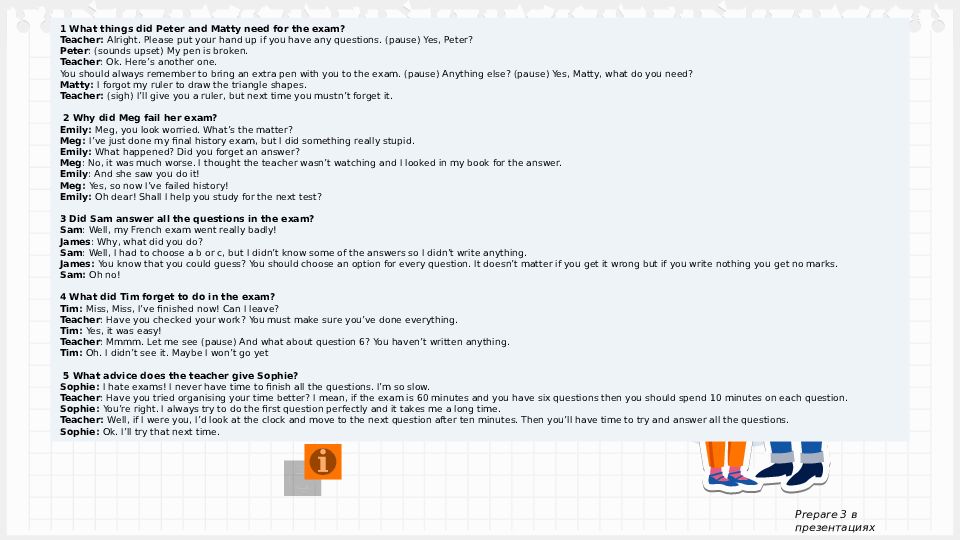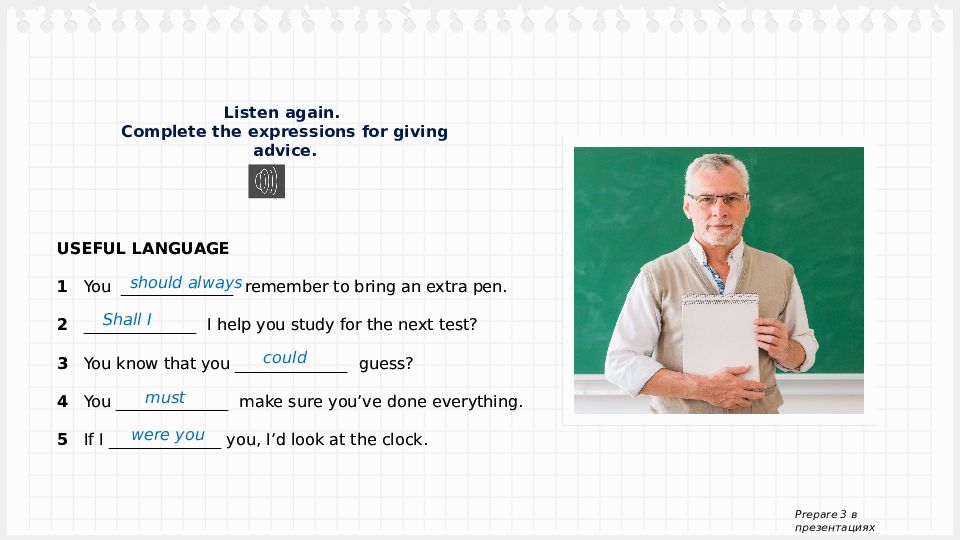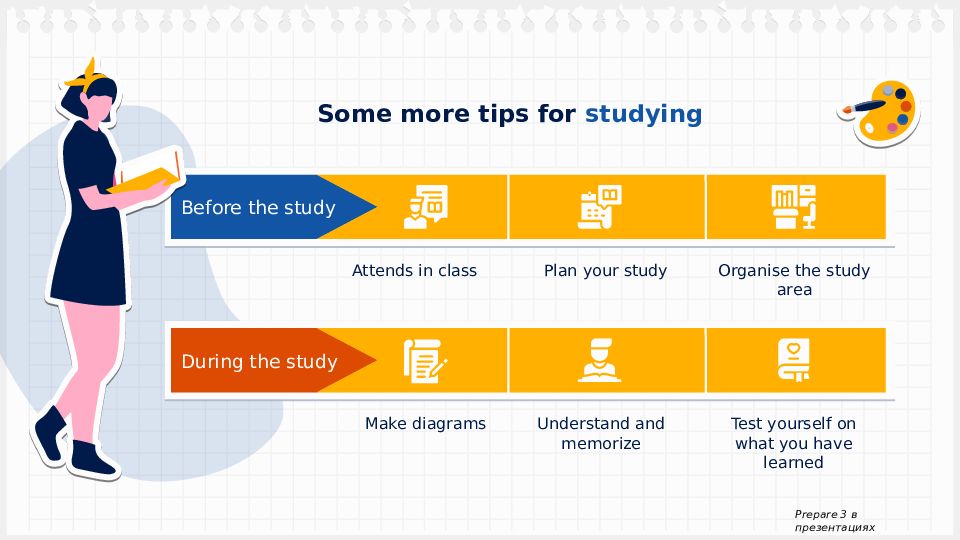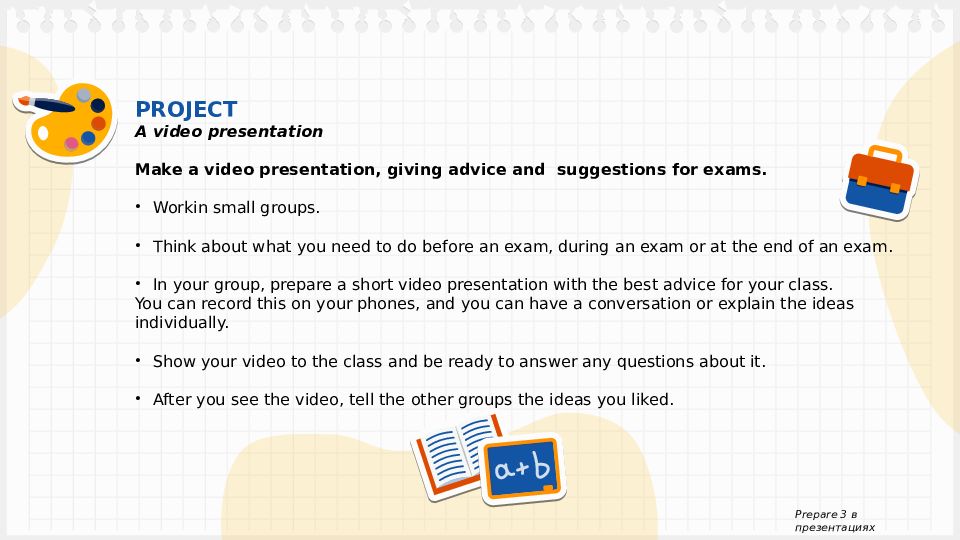Первый слайд презентации: Life Skills Study Skills TAKING EXAMS
Prepare 3 в презентациях
Слайд 2: LIFE SKILLS
When you have an exam you should: organise your time prepare what you need k eep calm and don’t worry! Taking exams can make you feel nervous or worried. If you prepare well and relax, you will do your best. Prepare 3 в презентациях
Слайд 3
Look at the statements. Are they true for you? 1 I have a good memory. 2 I find some exams difficult. 3 I don’t worry about exams. 4 I can never finish exams in the time. 5 I like doing exams. Prepare 3 в презентациях
Слайд 4: Do you think these ideas are important when you have to study for exams?
how much you sleep what you eat preparation techniques organising your time talking to your teacher doing physical exercise Read the text on the next slide and tick the ideas that are mentioned. Prepare 3 в презентациях
Слайд 5
A. Don’t spend too long on one topic, but do a little of each subject every day or week. Make a timetable for the afternoons or evenings, with study time, eating time and include some free moments. B. It’s difficult to remember too many things at the same time, so if you have a lot of information to learn, divide it into sections. C. For example, draw a picture next to a foreign word you want to remember. Or, to remember the formula E=mc 2, you could write ” The elephant made cakes twice ”. D. We often remember better if we can see a kind of picture of the most important points. This makes it easier to connect the information in our minds. how much you sleep what you eat preparation techniques organising your time talking to your teacher doing physical exercise A B C D Prepare 3 в презентациях
Слайд 6
E. Healthy food gives you energy and helps you to concentrate. F. Stand up every hour and move around. Have a small snack or a short walk to clear your mind. G. Don’t stay up late to send messages on your phone or play video games. It’s better to go to bed not too late, get up early the next day and review what you studied the day before. H. You can test each other on what you need to know. For example, if you are studying history, say the name of an important event and then your friend can say the date, or say the date and he/she can try to say the event. I. Find time to do some physical activity at the weekend or during the week. how much you sleep what you eat preparation techniques organising your time talking to your teacher doing physical exercise E F G H I Prepare 3 в презентациях
Слайд 7: Complete the texts with the sentences
A. Don’t spend too long on one topic, but do a little of each subject every day or week. Make a timetable for the afternoons or evenings, with study time, eating time and include some free moments. B. It’s difficult to remember too many things at the same time, so if you have a lot of information to learn, divide it into sections. C. For example, draw a picture next to a foreign word you want to remember. Or, to remember the formula E=mc 2, you could write ” The elephant made cakes twice ”. D. We often remember better if we can see a kind of picture of the most important points. This makes it easier to connect the information in our minds. 3. Organise your study time. 4. Try to learn information in small blocks. 1. Draw pictures or create sentences about information you have to learn. 2. Make mind maps with important information. Prepare 3 в презентациях
Слайд 8: Complete the texts with the sentences
E. Healthy food gives you energy and helps you to concentrate. F. Stand up every hour and move around. Have a small snack or a short walk to clear your mind. G. Don’t stay up late to send messages on your phone or play video games. It’s better to go to bed not too late, get up early the next day and review what you studied the day before. H. You can test each other on what you need to know. For example, if you are studying history, say the name of an important event and then your friend can say the date, or say the date and he/she can try to say the event. I. Find time to do some physical activity at the weekend or during the week. 7. Have a good breakfast before you go to school. 8. Make sure you have breaks. 5. Get plenty of sleep. 6. Exercise regularly to help your brain. 9. Revise with a friend. Prepare 3 в презентациях
Слайд 9: Answer the questions. Use ideas from the advice on studying for exams
A. Organise your study time. Don’t spend too long on one topic, but do a little of each subject every day or week. Make a timetable for the afternoons or evenings, with study time, eating time and include some free moments. B. Try to learn information in small blocks. It’s difficult to remember too many things at the same time, so if you have a lot of information to learn, divide it into sections. Answer the questions. Use ideas from the advice on studying for exams. 1 What information should you put in a study timetable? Prepare 3 в презентациях
Слайд 10
C. Draw pictures or create sentences about information you have to learn. Don’t stay up late to send messages on your phone or play video games. It’s better to go to bed not too late, get up early the next day and review what you studied the day before. 2. What can you do to remember foreign words? 3. What can you do in the morning when you have an exam? 4. What should you do when you take a break from studying? D. Make mind maps with important information. We often remember better if we can see a kind of picture of the most important points. This makes it easier to connect the information in our minds. E. Have a good breakfast before you go to school. Healthy food gives you energy and helps you to concentrate. F. Exercise regularly to help your brain. Stand up every hour and move around. Have a small snack or a short walk to clear your mind. Prepare 3 в презентациях
Слайд 11
G. Get plenty of sleep. Don’t stay up late to send messages on your phone or play video games. It’s better to go to bed not too late, get up early the next day and review what you studied the day before. 5. What shouldn’t you do at night instead of sleeping? 6. How can friends help each other to study? H. Revise with a friend. You can test each other on what you need to know. For example, if you are studying history, say the name of an important event and then your friend can say the date, or say the date and he/she can try to say the event. I. Exercise regularly to help your brain. Find time to do some physical activity at the weekend or during the week. Prepare 3 в презентациях
Слайд 12: What should you do when you have to prepare for exams?
Prepare 3 в презентациях
Слайд 13
Listen to the conversations and answer the questions. Conversation 1: What things did Peter and Matty need for the exam? Conversation 2: Why did Meg fail her exam? Conversation 3: Did Sam answer all the questions in the exam? Conversation 4: What did Tim forget to do in the exam? Conversation 5: What advice does the teacher give Sophie? 1 What things did Peter and Matty need for the exam? Teacher: Alright. Please put your hand up if you have any questions. (pause) Yes, Peter? Peter : (sounds upset) My pen is broken. Teacher : Ok. Here’s another one. You should always remember to bring an extra pen with you to the exam. (pause) Anything else? (pause) Yes, Matty, what do you need? Matty: I forgot my ruler to draw the triangle shapes. Teacher: (sigh) I’ll give you a ruler, but next time you mustn’t forget it. 2 Why did Meg fail her exam? Emily: Meg, you look worried. What’s the matter? Meg: I’ve just done my final history exam, but I did something really stupid. Emily: What happened? Did you forget an answer? Meg : No, it was much worse. I thought the teacher wasn’t watching and I looked in my book for the answer. Emily : And she saw you do it! Meg: Yes, so now I’ve failed history! Emily: Oh dear! Shall I help you study for the next test? 3 Did Sam answer all the questions in the exam? Sam : Well, my French exam went really badly! James : Why, what did you do? Sam : Well, I had to choose a b or c, but I didn’t know some of the answers so I didn’t write anything. James: You know that you could guess? You should choose an option for every question. It doesn’t matter if you get it wrong but if you write nothing you get no marks. Sam: Oh no! 4 What did Tim forget to do in the exam? Tim: Miss, Miss, I’ve finished now! Can I leave? Teacher : Have you checked your work? You must make sure you’ve done everything. Tim: Yes, it was easy! Teacher : Mmmm. Let me see (pause) And what about question 6? You haven’t written anything. Tim: Oh. I didn’t see it. Maybe I won’t go yet 5 What advice does the teacher give Sophie? Sophie: I hate exams! I never have time to finish all the questions. I’m so slow. Teacher : Have you tried organising your time better? I mean, if the exam is 60 minutes and you have six questions then you should spend 10 minutes on each question. Sophie: You’re right. I always try to do the first question perfectly and it takes me a long time. Teacher: Well, if I were you, I’d look at the clock and move to the next question after ten minutes. Then you’ll have time to try and answer all the questions. Sophie: Ok. I’ll try that next time. Prepare 3 в презентациях
Слайд 14: Listen again. Complete the expressions for giving advice
USEFUL LANGUAGE 1 You ______________ remember to bring an extra pen. 2 ______________ I help you study for the next test? 3 You know that you ______________ guess? 4 You ______________ make sure you’ve done everything. 5 If I ______________ you, I’d look at the clock. should always Shall I could must were you Prepare 3 в презентациях
Слайд 15: Some more tips for studying
Before the study Some more tips for studying Attends in class Plan your study Organise the study area During the study Make diagrams Understand and memorize Test yourself on what you have learned Prepare 3 в презентациях
Слайд 16
PROJECT A video presentation Make a video presentation, giving advice and suggestions for exams. Workin small groups. Think about what you need to do before an exam, during an exam or at the end of an exam. In your group, prepare a short video presentation with the best advice for your class. You can record this on your phones, and you can have a conversation or explain the ideas individually. Show your video to the class and be ready to answer any questions about it. After you see the video, tell the other groups the ideas you liked. Prepare 3 в презентациях
